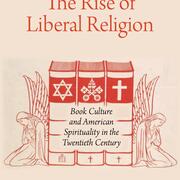Oxford University Press, 2013
Release Date: November 2012
Paperback release: January 2015
Winner of the 2013 Frank S. and Elizabeth D. Brewer Prize of the American Society of Church History
Named “Notable Title” for 2012 by the Society for US Intellectual History
Featured in The New York Times
“A Religious Legacy, With Its Leftward Tilt, Is Reconsidered”
Praise
“Lively. Hedstrom's work is a welcome contribution to a new generation of scholarship on liberal religion in America.”—Books & Culture
"This is a useful contribution to the study of American religion in the twentieth century.”—Theology
"Hedstrom makes historians view liberal religion beyond institutional criteria of church or denominational growth and decline … a thoroughly researched and engaging monograph.”—Church History
I came away from Hedstrom's book with a rich understanding of the culture of midcentury liberal religion.... Hedstrom has set an exciting agenda for future scholars.”—The Journal of Religion
"Outstanding... extraordinarily interesting.”—Journal of the American Academy of Religion
"Thoughtful and erudite.”—Christian Century
"This description of the marriage of liberal religion and publishing in the US in the 20th century fuses a deep familiarity with historical archives, sensitivity to the movement of American religious practices, and insightful interpretations of texts and images...Recommended.”—CHOICE
"Belongs on the to-read list.”—Richmond Times-Dispatch
"Hedstrom's terrific study suggests that there is much more to the story of religious liberalism in twentieth and twenty-first-century America than the numerical decline of mainline Protestant churches.”—American Historical Review
"Perceptive and compelling. Hedstrom offers a creative spin on a familiar story.”—The Journal of American History
"An original and eye-opening study, planting liberal religion in the wider history of liberalism, including its middlebrow culture of print. Hedstrom shows how liberal religion keeps renewing itself by sidling up to secular culture, and by welcoming wave after wave of refugees from orthodoxy on the one hand and agnosticism on the other, all of them drawn to the premise of liberal spirituality that science and religion make excellent bedfellows.”—Richard Fox, Professor of History, University of Southern California
"Smart, innovative, and fascinating... Hedstrom tells a compelling story. He masterfully blends important theoretical insights with an engaging narrative... This is an excellent, well-written, and transformative study that scholars will be wrestling with for years to come." —Register of the Kentucky Historical Society
"Hedstrom's work is highly recommended to students of American religions, those interested in the history of the book, twentieth-century historians, and scholars of spirituality.”—Textual Cultures
"Hedstrom shows that the prevailing values of liberal Protestantism were widely disseminated through mass-market, 'middlebrow' books during the middle decades of the twentieth century, influencing ostensibly secular domains of popular culture in ways that no previous scholar has established. This is a strikingly original, crisply argued contribution to cultural and religious history.”—David A. Hollinger, Preston Hotchkis Professor of History, University of California, Berkeley
"Hedstrom dexterously knots together several cultural threads: liberal Protestantism, middlebrow reading habits, corporate publishing, popular psychology, and seeker spirituality. The expectation that the right religious books—mystical, adventuresome, psychologically attuned, and affordable—would arrest modernity's dissolutions was perhaps another instance of liberal Protestantism's unrequited optimism, but Hedstrom makes a compelling case for just how potent this publishing mission was from the 1920s through the 1940s and beyond.”—Leigh Eric Schmidt, Edward Mallinckrodt University Professor, Washington University in St. Louis
"In this engrossing study, Matthew Hedstrom provides nothing less than a series of revelations—about the construction of liberal religion, the circulation of books, and indeed the making of modern spiritual selves. Hedstrom's work will reshape historians' understanding of religion in 20th-century America. For those who wish to push the historical analysis, this book will also invite new questions about liberal religion in 2013 and beyond.”—Lauren F. Winner, Assistant Professor of Christian Spirituality, Duke Divinity School
"Hedstrom brilliantly describes some of the unforseen results of this new complicity between religion and consumer culture." —The Journal of Unitarian Universalist History
"In the modern age of mass-culture and commoditization, liberal religious intellectuals reasoned that the consumption of good books could make a far-reaching contribution to the spiritual formation of American readers. Matthew Hedstrom delivers a deeply thoughtful and thoroughly researched study that urges us to recognize how liberal religion used mass-culture rather than just sneered at it, and to think hard about reading and spirituality today. The legacy of liberal religion is larger than we might have thought.”—David Morgan, Professor of Religion, Duke University
Reviews
The Rise of Liberal Religion has been reviewed in Journal of American History, Journal of the American Academy of Religion, American Historical Review, Journal of Religion, Church History, Christian Century, Books and Culture, Journal of Interdisciplinary History, Modern Intellectual History, Theology, Textual Criticism, Choice, Register of the Kentucky Historical Society, US Intellectual History blog, Journal of Unitarian Universalist History, other sites online.
Media
“When the Mainline Told Us What to Read,” Christian Century, Now and Then blog, June 5, 2013
“Historian Matthew Hedstrom Details the Evolution of ‘Post-Protestant Spirituality’” ShelfLife@Texas Blog
“Book Culture and the Rise of Liberal Religion,” Religion and Politics January 29, 2013
Interview, Religion in American History blog, “Liberals Rising.” Part 1 | Part 2
Interview, WMRA’s Virginia Insight, “Religion and the Hidden Impact of Books.” December 6, 2012“
A History of the Unaffiliated: How the ‘Spiritual Not Religious’ Gospel Has Spread,” Religion Dispatches, October 24, 2012
New Books in Religion podcast interview
